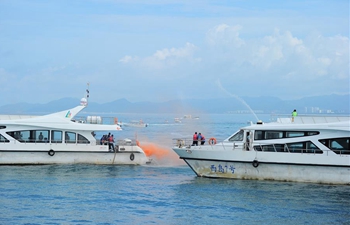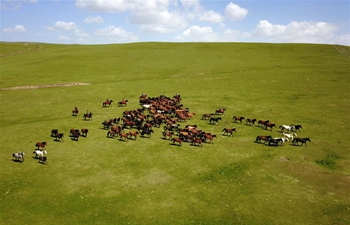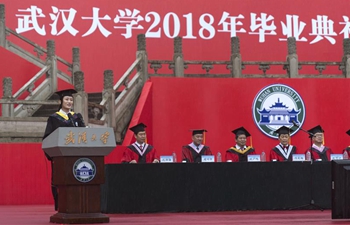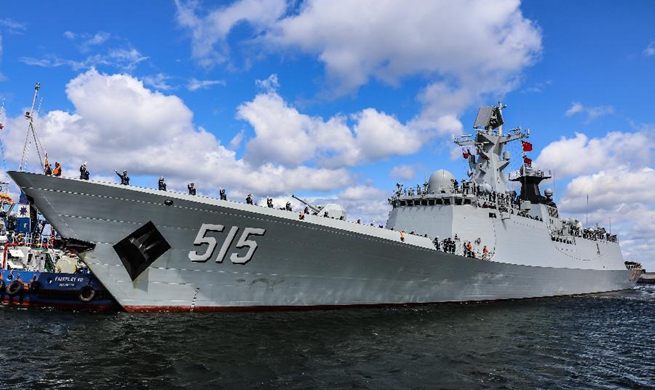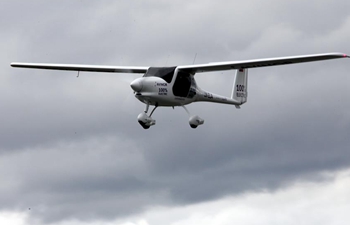ISTANBUL, June 23 (Xinhua) -- The Turkey-U.S. deal on resolving the dispute on the Syrian city of Manbij could lead to further territorial division in Syria, analysts said.
Based on the deal concluded earlier this month, Turkish troops started Monday patrols on the outskirts of the previously Kurdish militia-controlled Manbij in northern Syria.
"Manbij is a model. The Manbij model is also important for Syria's future," Turkish Foreign Minister Mevlut Cavusoglu said Tuesday.
"The Manbij area will be handed over to its real owners after being cleared (of terrorists)," he added.
Turkey's top diplomat's remarks indicated that Manbij would later be handed over to local people rather than the Syrian government which Ankara sees as illegitimate.
Hasan Koni, a professor of international law at Istanbul Kultur University, told Xinhua that the Turkey-U.S. move in Manbij would prepare the ground for the creation of an area to be controlled by moderate Sunni groups, leading to further territorial division within the war-torn Syria.
Turkey and the U.S., which has some troops stationed in the Kurdish-held areas, would act as patrons of Sunni Manbij under the U.S. leadership, he remarked.
The U.S. recently made clear it would not allow the Syrian army to recapture areas previously under Kurdish control.
Ankara argues Manbij is an Arab town and the Kurdish militia, the People's Protection Units (YPG) which Ankara sees as a terror group, must leave it.
The U.S. will, under the deal, have the YPG leave Manbij after disarming it, and a local council, which will be composed of mainly Arabs, will be established.
Cavusoglu said Turkish and U.S. troops would jointly maintain security in the Manbij area after YPG's departure.
Turkey, highly disturbed about Washington's military support to the Kurdish militia, has declared any YPG presence on the western bank of the Euphrates as a red line for its national security.
The Turkish army currently controls over 4,000 square km of territory in northwestern Syria along its border.
The military took control of the area, which borders Manbij in the north and west, in two separate major military offensives against the YPG and the Islamic State (IS) in 2016 and 2017.
Top Turkish officials said in the past that the areas seized from the YPG and IS would be handed over to local people rather than the Syrian government, as Ankara says Syrian President Bashar al-Assad should have no place in the future of Syria.
Faruk Logoglu, a former senior Turkish diplomat, said Ankara's vision for Syria, or the Manbij model, would increase the risk of disintegration of its war-torn neighbor.
Koni also said Turkey's attitude simply serves to boost the risk of Syria's disintegration.
He suspects that the Manbij deal between Ankara and Washington is part of the efforts to drive Iranian forces out of Syria due to Israeli concerns for security.
Israel, known to be highly disturbed about Iranian presence in Syria, has several times launched airstrikes against allegedly Iran-linked targets there during the past year.
Both Damascus and Tehran, another staunch Damascus ally, deny the presence of any Iranian troops or military bases in Syria, saying only some Iranian military advisors are on the ground.
The Turkish government has been much criticized at home for its support until mid-2016 for the rebels fighting to topple the Syrian regime.
There have been reports that Ankara seeks to create a Sunni zone under its sway near its border with Syria.
With Ankara's backing, Syria's Sunni rebel groups, which came together under the name of the Free Syrian Army, have fought alongside the Turkish troops to oust the YPG forces from the areas, including Afrin, near the Turkish border.





